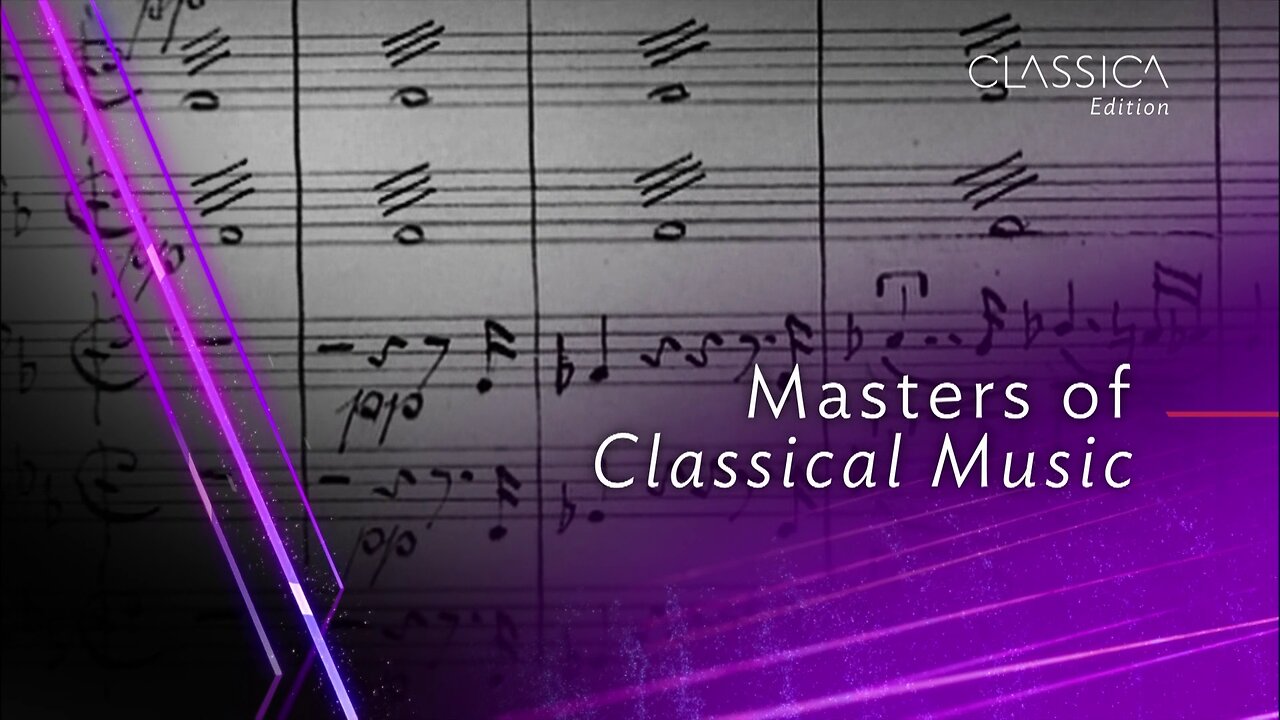Premium Only Content

Masters of Classical Music | Discovering Mozart's Symphony No.41 'Jupiter' (Episode 2)
Konzerthaus, Berlin (2005) with the Carl Philipp Emanuel Bach Chamber Orchestra conducted and hosted by Hartmut Haenchen who analyzes the composer Wolfgang Amadeus Mozart's most famous works. Audio in English, with subtitles in English for the German parts.
Mozart completed his Symphony No. 41 in C major, K. 551, on 10 August 1788. The longest and last symphony that he composed, it is regarded by many critics as among the greatest symphonies in classical music. The work is nicknamed the Jupiter Symphony, probably coined by the impresario Johann Peter Salomon. The autograph manuscript of the symphony is preserved in the Berlin State Library.
The symphony is scored for Flute, 2 Oboes, 2 Bassoons, 2 Horns in C and F, 2 Trumpets in C, Timpani in C and G, First and Second Violins, Violas, Cellos and Double Basses. Symphony No. 41 is the last of a set of three that Mozart composed in rapid succession during the summer of 1788. No. 39 was completed on 26 June and No. 40 on 25 July. Nikolaus Harnoncourt argues that Mozart composed the three symphonies as a unified work, pointing, among other things, to the fact that the Symphony No. 41, as the final work, has no introduction (unlike No. 39) but has a grand finale.
in the summer of 1788 Mozart completed his last three symphonies in E-flat major, G minor and C major, the last of them lated described as his "Jupiter" Symphony. Mozart bequeathed to an astonished posterity music of altogether otherworldly perfection, music which, dismayingly beautiful , is "not of this world". The Swiss theologian Karl Barth even susggested that the angels probably play Bach whenever they want to praise God but that among themselves and for their own pleasure they doubt play Mozart. Even though Mozart's life and works are uncommonly well documented, not least in the form of countless letters that attest to the composer's verbal wit and unconventional thinking, as a person and as a historical figure he reimains and insoluble riddle, and inexplicable phenomenon. "it often seems as if Mozart lived and loved and suffered with an all-consuming intensity," wrote Hermann Hesse, "and then again one has the impression that he did not live at all and that each provocation and appeal of reality immediately and without further ado became music in this blessed spirit.
-
 25:19
25:19
Adaneth - Arts & Literature
1 month agoClassical Destinations I | St, Petersburg: Shostakovich & Tchaikovsky (Episode 13)
672 -
 LIVE
LIVE
TonYGaMinG
4 hours ago🌃 Neon Nights, Cyber Fights 🤘| Cyberpunk 2077 Live | PART 1
5,528 watching -
 29:16
29:16
The Shannon Joy Show
1 day ago🔥🔥The Extraordinary Healing POWER Of The Sun - With Dr. Chad Walding🔥🔥
1.41K1 -
 15:27
15:27
Sideserf Cake Studio
1 day ago $10.40 earnedThis K-Pop Demon Hunters CAKE is how it's done, done, done!
32.8K14 -
 54:47
54:47
Side Scrollers Podcast
1 day agoSide Scroller Presents KING OF THE KART | MASSIVE MARIO KART TOURNAMENT
74.9K2 -
 LIVE
LIVE
Astral Doge Plays!
2 hours agoZelda NES Randomizer ~LIVE!~ Let the Randomization Begin!
98 watching -
 33:18
33:18
Athlete & Artist Show
12 hours ago $2.28 earnedHockey Is Back In Europe!
20.7K3 -
 LIVE
LIVE
Total Horse Channel
5 hours ago2025 URCHA Futurity | Derby & Horse Show | Sunday
153 watching -
 LIVE
LIVE
GhillieSuitGaming
1 hour agoThe Evil Within 2: Part 4 - Art Destruction!
51 watching -
 LIVE
LIVE
Chi-Town Gamers Livestreams
2 hours agoGears 5 Ep. 4 W/ CTG | Into Kait's Mental Issues | GOW: RELOADED LATER & SHENANIGANS 😎
36 watching